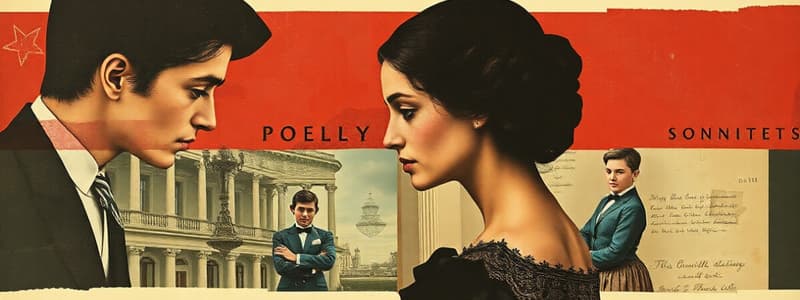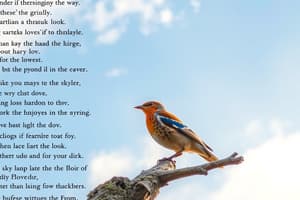Podcast
Questions and Answers
The opening line, "Not at first sight," of the poem deliberately breaks which literary convention?
The opening line, "Not at first sight," of the poem deliberately breaks which literary convention?
- The use of iambic pentameter in sonnets.
- The Petrarchan ideal of unattainable love.
- The Shakespearean tradition of sonnet structure.
- Marlowe's established concept of immediate love. (correct)
What is implied by the phrase “Look in thy heart and write” in the context of the sonnet?
What is implied by the phrase “Look in thy heart and write” in the context of the sonnet?
- Approaching conventions with individuality. (correct)
- Ignoring personal emotions in favor of traditional themes.
- Prioritizing technical skill above emotional depth.
- Blindly following established poetic styles.
How does the analysis of the word 'drib' differ from Ringler's interpretation, and what is the significance of this difference?
How does the analysis of the word 'drib' differ from Ringler's interpretation, and what is the significance of this difference?
- Ringler considers it a frequentative form, whereas the analysis identifies it as the root, affecting the imagery of scattered arrows. (correct)
- Ringler views it as the root word, while the analysis sees it as a variant, impacting the understanding of Cupid's aim.
- Ringler interprets it as 'drip', while the analysis sees it as 'scatter', changing the context of the poem.
- Ringler defines it as an archaic term, while the analysis uses a modern definition, altering the poem's tone.
In lines 3-4, the siege metaphor describes love as:
In lines 3-4, the siege metaphor describes love as:
What is the more likely interpretation of “what Love decreed” in line 6, considering the context of courtly love?
What is the more likely interpretation of “what Love decreed” in line 6, considering the context of courtly love?
The phrases “Wou’t drink up eisel? Eat a crocodile?” serve to illustrate:
The phrases “Wou’t drink up eisel? Eat a crocodile?” serve to illustrate:
In line 8, the 'partial lot' refers to:
In line 8, the 'partial lot' refers to:
What was the primary source of a knight's glory in the context of courtly love?
What was the primary source of a knight's glory in the context of courtly love?
How did courtly love function within a court environment?
How did courtly love function within a court environment?
The mention of the “Muscovite” in line 10 is used to represent:
The mention of the “Muscovite” in line 10 is used to represent:
According to Hakluyt’s Voyages, what would happen to a wealthy Muscovite unfit for war?
According to Hakluyt’s Voyages, what would happen to a wealthy Muscovite unfit for war?
What does Hakluyt's Voyages suggest about the Muscovite people's attitude towards the Tsar's redistribution of wealth?
What does Hakluyt's Voyages suggest about the Muscovite people's attitude towards the Tsar's redistribution of wealth?
What motivated the London merchants to set up the expedition described in Hakluyt’s Voyages?
What motivated the London merchants to set up the expedition described in Hakluyt’s Voyages?
What happened to Willoughby during the expedition described in Hakluyt’s Voyages?
What happened to Willoughby during the expedition described in Hakluyt’s Voyages?
Who ultimately carried out the business of the expedition after Willoughby's loss?
Who ultimately carried out the business of the expedition after Willoughby's loss?
Who brought up Richard Chancellor?
Who brought up Richard Chancellor?
What role did Master Henry Sidney later assume in Wales and Ireland?
What role did Master Henry Sidney later assume in Wales and Ireland?
What does the reference to Master Henry Sidney’s eloquent speech suggest about his character?
What does the reference to Master Henry Sidney’s eloquent speech suggest about his character?
What was King Edward’s relationship with Master Henry Sidney?
What was King Edward’s relationship with Master Henry Sidney?
How does the description of the Muscovite legal system during that time contrast with the English system, based on the text?
How does the description of the Muscovite legal system during that time contrast with the English system, based on the text?
What can be inferred about the role of women in the courtly love tradition described in the sonnet?
What can be inferred about the role of women in the courtly love tradition described in the sonnet?
How did the societal structure in Muscovy, as depicted in the text, support the Tsar’s ability to redistribute wealth?
How did the societal structure in Muscovy, as depicted in the text, support the Tsar’s ability to redistribute wealth?
What does the mention of the ages of people within a court (13 to 30) imply about the environment?
What does the mention of the ages of people within a court (13 to 30) imply about the environment?
Why might the London merchants have had a “slant towards commercial property and interests” in their historical accounts?
Why might the London merchants have had a “slant towards commercial property and interests” in their historical accounts?
What does the text suggest about the relationship between courtly love and physical attraction?
What does the text suggest about the relationship between courtly love and physical attraction?
What does the story of Willoughby and Chancellor reveal about the nature of early English expeditions?
What does the story of Willoughby and Chancellor reveal about the nature of early English expeditions?
What assumptions are made when interpreting the line 'what Love decreed' in a sexually suggestive way, and why are they likely incorrect?
What assumptions are made when interpreting the line 'what Love decreed' in a sexually suggestive way, and why are they likely incorrect?
Consider the cultural context in which Muscovites “willingly” gave their property to the Tsar, what social pressures could have influenced "willingly"?
Consider the cultural context in which Muscovites “willingly” gave their property to the Tsar, what social pressures could have influenced "willingly"?
How did the structure of courtly love potentially affect social mobility within a royal court?
How did the structure of courtly love potentially affect social mobility within a royal court?
What does the phrase "obedience of all men generally to their Prince" demonstrate about the era?
What does the phrase "obedience of all men generally to their Prince" demonstrate about the era?
Knowing that Chancellor was brought up by Master Henry Sidney, what insight can be inferred about Chancellor's social standing and opportunities?
Knowing that Chancellor was brought up by Master Henry Sidney, what insight can be inferred about Chancellor's social standing and opportunities?
Considering the risks of early sea voyages, what motivated individuals like Chancellor and Willoughby to undertake such expeditions?
Considering the risks of early sea voyages, what motivated individuals like Chancellor and Willoughby to undertake such expeditions?
In the context of courtly love, how might a knight's motivation for undertaking extreme labors be viewed differently by the knight versus the lady he serves:
In the context of courtly love, how might a knight's motivation for undertaking extreme labors be viewed differently by the knight versus the lady he serves:
How can we describe Hakluyt's Voyages perspective?
How can we describe Hakluyt's Voyages perspective?
How did King Edward's patronage of individuals like Master Henry Sidney affect the stability and cultural development of his court?
How did King Edward's patronage of individuals like Master Henry Sidney affect the stability and cultural development of his court?
Flashcards
Not at first sight
Not at first sight
Deliberately breaking convention, contrasting with Marlowe's idea of instant love.
Meaning of 'drib'
Meaning of 'drib'
Not scattering, but a single, possibly flawed shot that succeeded.
Siege Metaphor
Siege Metaphor
Metaphor for gradual conquest, like a tunnel leading to capture.
What Love Decreed
What Love Decreed
Signup and view all the flashcards
Partial Lot
Partial Lot
Signup and view all the flashcards
Muscovite
Muscovite
Signup and view all the flashcards
Study Notes
- "Not at first sight" intentionally breaks convention, contrasting with Marlowe's "Who ever loved, that loved not at first sight?".
- The line "Look in thy heart and write" from the previous sonnet suggests an independent approach to conventions.
- "Drib" originates from "drip" and is the root word, with "dribble" being its frequentative form.
- Cupid's shot was singular and successful; it was neither instant nor a miss.
- Lines 3-4 employ a siege metaphor, depicting an underground tunnel gradually leading to the capture of a fortress.
- "What Love decreed" shouldn't be interpreted in a sexual sense, aligning with courtly love's avoidance of such matters.
- It refers to avoiding actions from "The Art of Love", like performing dangerous feats for a lady.
- "Partial lot" alludes to a knight's extreme efforts in courtly love for minimal reward, emphasizing faith over gain.
- A court was full of repressed sexuality among young people with courtly love serving as sublimation.
- "Muscovite" refers to the absolute power of the Tsars and its surprising acceptance by the English.
- English visitors were astonished by the Tsar's power to redistribute wealth.
- People willingly gave up their wealth at the Tsar's command, viewing it as restoring others' goods with the Tsar bestowing them to courtiers based on merit.
- Hakluyt's Voyages, particularly Willoughby and Chancellor's account from 1553, reveals the London merchants' commercial interests.
- Willoughby was lost at sea, and Richard Chancellor took over.
- Richard Chancellor was mentored by Master Henry Sidney, who was close to King Edward.
- This Henry Sidney is likely Philip Sidney's father, who later became Sir Henry.
Studying That Suits You
Use AI to generate personalized quizzes and flashcards to suit your learning preferences.




